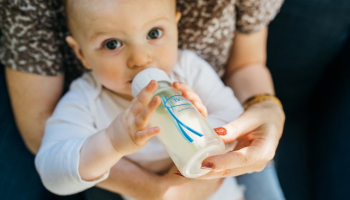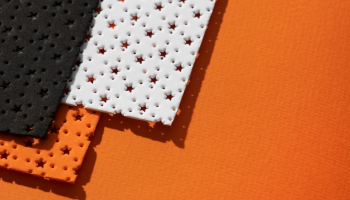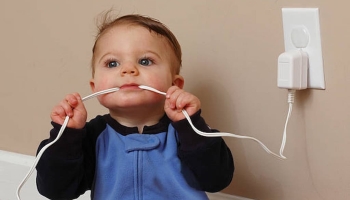
Formula milk is a great option for parents who are unable to breastfeed their babies. It provides all the necessary nutrients to help your baby grow and stay healthy. However, preparing and storing formula milk can be a bit tricky, especially when it comes to night feeds. In this article, we will discuss the best ways to store formula milk for night feeds and ensure that your baby gets the best possible nutrition.
Understanding formula milk is the first step to preparing and storing it correctly. Formula milk is made up of a mixture of water and powdered formula. It is important to use the correct ratio of water to powder formula as this affects the nutritional value of the milk. Additionally, formula milk should be prepared using clean and sterilized equipment to prevent contamination. Once prepared, formula milk should be stored correctly to ensure that it remains safe for your baby to drink.
Preparing formula milk for night feeds is not always convenient, especially if you have a crying baby in the middle of the night. However, there are ways to make the process easier. One option is to prepare the formula in advance and store it in the fridge. This way, you can quickly warm it up when your baby wakes up for a feed. Another option is to use a formula dispenser to pre-measure the powder and take it with you to bed. This way, you can quickly make up a baby bottle of formula without having to measure the powder in the middle of the night.
Key Takeaways
- Understanding the correct ratio of water to powder is essential for preparing formula milk.
- Formula milk should be stored correctly to ensure it remains safe for your baby to drink.
- Preparing infant formula in advance or using a formula dispenser can make night feeds easier.
Understanding Formula Milk
Formula milk is a type of baby food that is designed to provide all the necessary nutrients for an infant’s growth and development. It is a popular alternative to breast milk for mothers who cannot or choose not to breastfeed their babies.
There are different types of formula milk available in the market, including cow’s milk-based, soy-based, and hypoallergenic formulas. Each type of concentrated formula has its unique composition, and the choice of formula depends on the baby’s needs and any allergies or intolerances they may have.
Formula concentration is another important factor to consider when preparing formula milk. The concentration of formula can be adjusted according to the baby’s age and nutritional requirements. It is essential to follow the instructions on the formula packaging carefully and use the correct amount of water and powder to prepare the formula.
Nutrition is a crucial aspect of formula milk, and it should provide all the necessary nutrients for the baby’s growth and development. Formula milk contains essential vitamins, minerals, and macronutrients such as protein, carbohydrates, and fat.
Formula-fed babies may have different feeding patterns than breastfed babies. They may require more frequent feedings, and the amount of formula they consume may vary depending on their age and appetite.
Overall, formula feeding can be a safe and effective way to provide nutrition for infants who cannot or choose not to breastfeed. It is essential to follow the recommended guidelines for preparing and storing formula milk to ensure the baby’s safety and well-being.
Preparing Formula Milk for Night Feeds
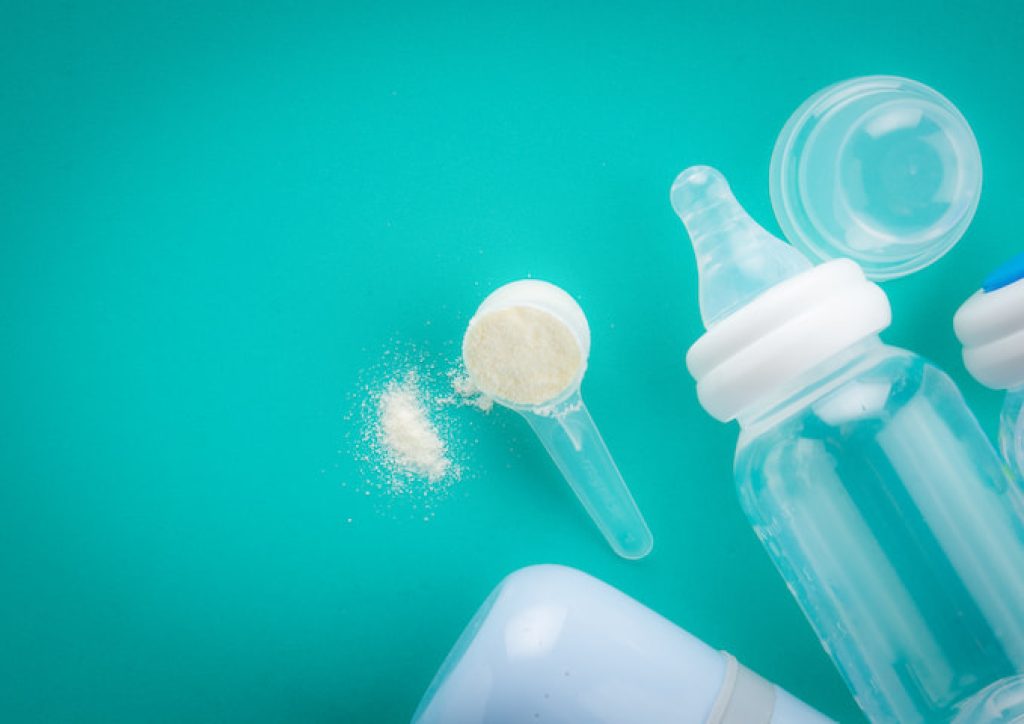
When it comes to preparing formula milk for night feeds, there are a few things to keep in mind to ensure your baby gets the nutrition they need while also keeping them safe. Here are some tips for preparing formula milk for night feeds.
Choosing the Right Equipment
First and foremost, it’s important to choose the right equipment for preparing formula milk. This includes bottles, caps, and a formula dispenser or maker. Make sure these items are clean and sterilized before being ready to use formula in.
Mixing the Formula
When mixing the formula, it’s important to follow the instructions on the packaging carefully. Measure the correct amount of powdered infant formula or ready-to-feed formula into the bottle, and add the appropriate amount of tap water that has been boiled and cooled to the correct temperature.
After adding the water, cap the bottle and shake it gently to mix the formula. If using a formula maker or mixer, follow the instructions provided by the manufacturer.
Labeling the Bottles
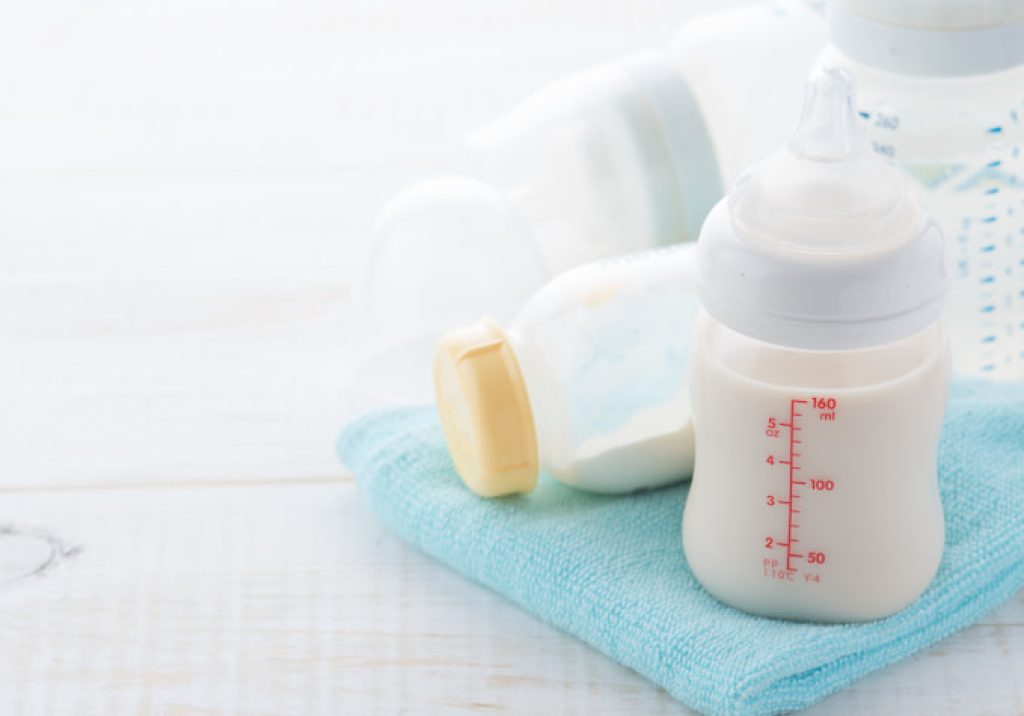
To ensure you know which bottle to use for each feed, it’s important to label them with the date and time they were prepared. This will also help you keep track of how long the formula has been stored, as it should not be kept for more than 24 hours after preparation.
In summary, preparing formula milk for night feeds requires choosing the right equipment, measuring and mixing the formula carefully, and labeling the bottles to keep track of when they were prepared. By following these tips, you can ensure your baby gets the nutrition they need while also keeping them safe.
Storing Formula Milk for Night Feeds
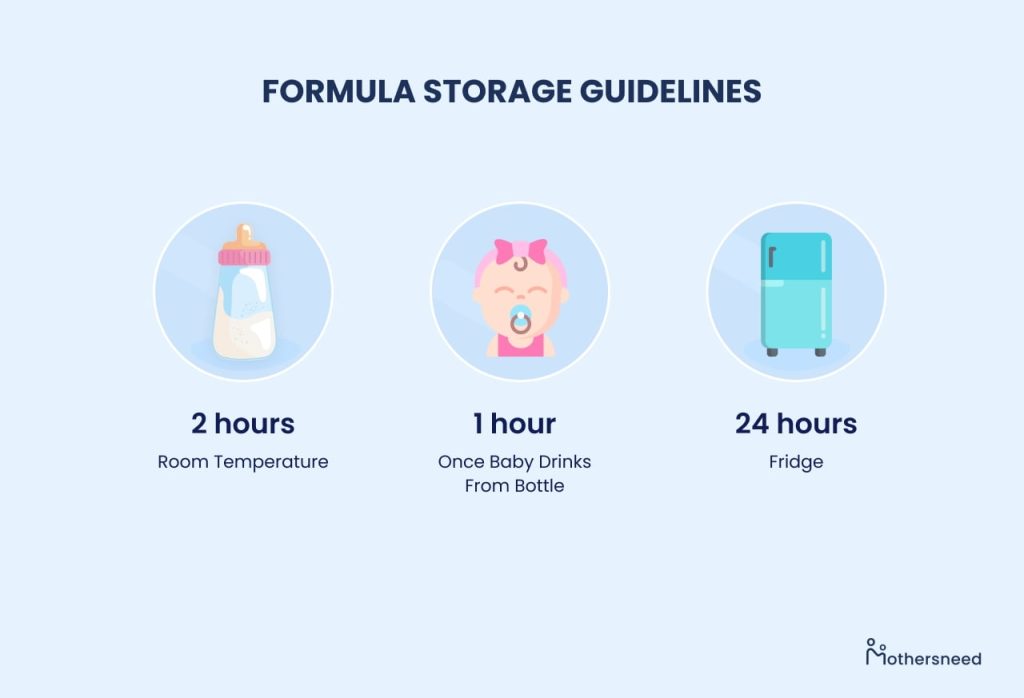
Keeping the Formula Safe
When it comes to storing your infant formula preparation and milk for night feeds, it is important to keep it safe and free from contamination. Always wash your hands thoroughly before preparing the formula and ensure that all the equipment you use is clean and sterilized.
It is also essential to check the expiration date on the formula milk before storing it. If the formula has expired, it should not be used. Always follow the instructions on the formula packaging for the correct amount of water and formula powder to use.
Refrigerating the Formula
Refrigerating the formula milk is the best way to store it for night feeds. Once the formula has been prepared, it can be stored in the refrigerator for up to 24 hours. It is essential to store the formula milk in a sealed container and label it with the date and time it was prepared.
When it is time for a night feed, warm the refrigerated formula by placing the bottle in a bowl of warm water. Never microwave the formula, as this can create hot spots that can burn your baby’s mouth.
Traveling with Formula
If you need to travel with formula milk for night feeds, it is essential to keep it cool to prevent bacteria growth. You can use a cooler bag with ice packs to keep the formula cold. Alternatively, you can use a bottle warmer with a cooler function that can keep the formula at a safe temperature for up to 8 hours.
When traveling, always pack extra formula milk in case of any unexpected delays or spills. It is also important to bring along a clean, sterilized bottle and nipple for each feed.
In summary, storing formula milk for night feeds requires proper preparation, storage, and handling. Always follow the instructions on the formula packaging, keep the formula safe and free from contamination, refrigerate it for up to 24 hours, and use a cooler bag or bottle warmer with a cooler function when traveling.
Feeding Your Baby at Night
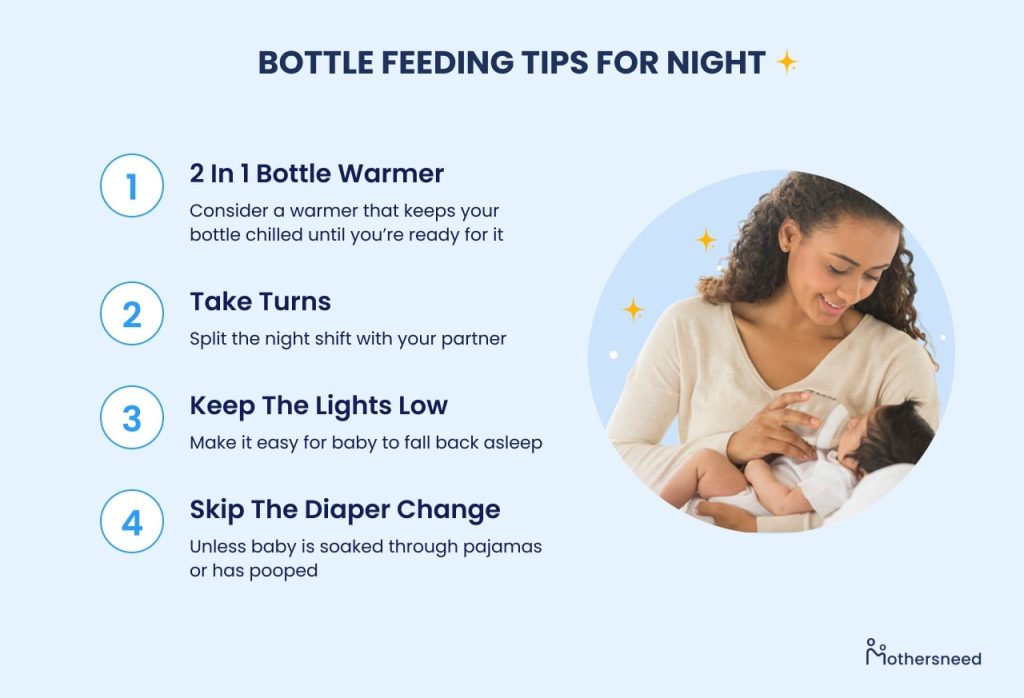
Feeding your baby at night can be a challenging task, especially when you are sleep-deprived. However, with the right preparation, you can make the process smoother for both you and your baby. Here are some tips for feeding your baby at night:
Warming the Formula
Before feeding your baby, you need to warm the formula to a suitable temperature. You can warm the formula in different ways, such as using a bottle warmer or placing the bottle in a bowl of warm water. It is important to note that microwaving the formula is not recommended as it can create hot spots in warm formula, that can burn your baby’s mouth.
If you are using a bottle warmer, follow the manufacturer’s instructions carefully. Make sure to test the temperature of the formula on your wrist before feeding your baby. Baby’s formula should be warm, not hot.
Ensuring Safety During Feeding
When feeding your baby at night, safety should be your top priority. Make sure to hold your baby securely and support their head and neck. Use a nipple that is appropriate for your baby’s age and size. Check the nipple regularly for signs of wear and tear, and replace it if necessary.
It is also important to ensure that the formula is safe for your baby to consume. If the formula has been refrigerated, warm it to room temperature or a little warmer before feeding your baby. Do not leave the warmed formula out at room temperature for more than two hours. If your baby does not finish the bottle, discard any remaining formula.
Finally, make sure to burp your baby after feeding to release any trapped air. This can help prevent discomfort and reduce the risk of spitting up.
In conclusion, feeding your baby at night can be a challenge, but with the right preparation and safety measures, you can make the process smoother for both you and your baby.
Health and Safety Considerations
Preventing Bacterial Growth
When it comes to storing formula milk for night feeds, preventing bacterial growth is crucial. Bacteria can grow rapidly in warm environments, so it’s important to store formula milk in a cool and dry place. It’s recommended to store formula milk in a refrigerator at a temperature of 4°C or lower.
Before preparing the formula milk, it’s important to wash your hands thoroughly with soap and water. Also, make sure that all the utensils, bottles, and nipples are clean and sterilized. Sterilization can be achieved by boiling the utensils in hot water, for at least 5 minutes or using a sterilizer.
Understanding the Risks of Improper Storage and Preparation
Improper storage and preparation of formula milk can increase the risk of bacterial contamination, which can lead to food poisoning and other infections. Cronobacter is a type of bacteria that can be found in powdered formula milk and can cause severe infections in infants, especially those born prematurely or with already weakened immune system systems.
To reduce the risk of contamination, it’s essential to follow the guidelines, recommendations, directions, and instructions provided by the CDC and other health organizations. It’s also important to use formula milk within the recommended time frame after opening the container and to discard any unused formula milk after feeding.
In conclusion, storing formula milk for night feeds requires careful consideration of health and safety factors. By following the recommended guidelines, cleaning and sterilizing utensils, and storing formula milk in a cool and dry place, parents can safely use formula milk for their infants’ night feeds.
Dealing with Leftover Formula
When it comes to preparing formula milk for night feeds, it’s not uncommon to have some leftover milk. However, it’s important to know how to handle this milk to avoid waste and spoilage.
If the formula milk has been freshly prepared, it can be stored at room temperature for up to two hours. After that, it should be discarded. If the milk has been opened and partially consumed, it should be refrigerated and used within 24 hours.
If the formula milk has not been opened, it can be stored at room temperature until the expiration date on the packaging. Once opened, it should be refrigerated and used within 24 hours.
To avoid waste, it’s best to only prepare the amount of formula needed for the feeding. However, if there is leftover milk, it can be used for up to two hours if it has been freshly prepared. If it has been partially consumed, it can be refrigerated and used within 24 hours.
It’s important to note that spoiled formula milk can make a baby sick, so it’s crucial to follow these guidelines to ensure the safety of the baby. By properly storing and handling leftover milk, parents can avoid waste and ensure their baby’s health.
Frequently Asked Questions
How long can formula milk be stored in the fridge?
Formula milk can be stored in the fridge for up to 24 hours. It is important to store it in the back of the fridge, where the temperature is the coldest, and to keep it covered. Once the baby formula has been warmed, it should be used within two hours.
What is the ratio of formula to water?
The ratio of formula to water is important to ensure that your baby is getting the correct amount of nutrients. The recommended ratio is one scoop of formula to two ounces of water. It is important to follow the instructions on the formula packaging, as different brands may have different ratios.
Is it safe to make up formula in advance for night feeds?
It is not recommended to make up formula in advance for night feeds. Formula should be made fresh for each feed to reduce the risk of bacterial growth. If you need to prepare your baby’s bottle with formula in advance, it should be stored in the fridge for no longer than 24 hours.
How long should you wait before giving formula to a baby?
Formula should be given to a baby as soon as it is prepared and at the correct temperature. It is important to test the temperature of the formula on your wrist before giving it to your baby, as your body temperature, it should be warm but not hot. If the formula has been warmed, it should be used within two hours.



